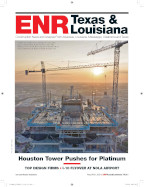The headquarters of design firm WSP Global Inc., tucked away from Montreal's commercial hub in a laid-back neighborhood, belies the core of what has become a $2.1-billion juggernaut.
The quiet pace of activity in the firm's 16th-floor executive suite, a remnant of its origin as much smaller engineer Genivar Inc., hardly reflects what has become an operation of more than 17,000 employees and 50,000-plus projects in 300 global offices—that is not yet finished with its worldwide expansion.
But as CEO Pierre Shoiry's mission to grow WSP—through acquisition and organically—moves to a new phase and attracts similarly visioned executives to help manage the expanding company, the team is adamant that WSP's professional-services foundation and culture will remain intact.
"We're trying to build something unique and different," says former Genivar CEO Shoiry, two years after he engineered the friendly $431-million purchase of WSP. At $1 billion in revenue, WSP was twice its buyer's size but lagging in stock value during the U.K.'s economic woes, despite its preeminence as a designer of such iconic landmarks as the Shard skyscraper in London.
Municipal engineer Genivar had been making numerous small acquisitions in Canada but needed a larger global leap and had the cash as a publicly owned firm since 2006, with large and loyal institutional investors. The firm was believed to have made an offer to buy Michael Baker Corp. in 2013 before its sale to an equity firm.
The 57-year-old Shoiry, an engineer who had run Genivar since the mid-1990s, says he "just picked up the phone" and called Chris [Coles, then WSP CEO], who became chairman of the enlarged company after the deal concluded in 2012. "We had a shared vision," says Shoiry. "I knew this was the right one."
Genivar-WSP Link 'Was a Good Deal'
Andy Brown, a stock market analyst with N+1 Singer Capital Markets Ltd., London, says the purchase "was a good deal" for Genivar, with WSP's per-share price down to $1.50. He suspects the U.K. firm's former investors "may be kicking themselves" over the enlarged firm's value jump, with its share-price closing on July 21 at $36.45 on the Toronto Stock Exchange.
 |
While Dollin told a U.K. construction publication in 2010 that he "didn't want to wake up American," in the wake of several major U.S. buys of British consultants, he says staff soon realized that after the Genivar link, "there was no geographic overlap and that a big corporate machine wasn't about to change everything."
Kamram Moazami, who led WSP's Shard design team, observes of the Montreal leadership: "When they make an important decision, they like to get our advice because we have that maturity."
Chief Financial Officer Alexandre L'Heureux, a former private-equity executive recruited in 2010 to help move the firm "to the next level," emphasizes management's push to empower its global enterprise, saying, "We're not changing how Stockholm is managed from the 16th floor in Montreal."
Even with all the WSP integration details not fully completed, Shoiry believes there is still plenty of market and geographic capacity to be added to the firm. "We're focused on building a pure-play consultancy," WSP's chief told a packed house of investors and analysts in Montreal last month, reiterating the firm's intention to be a 45,000-person company with revenue of nearly $5.3 billion in six years.
"We think we can build something that doesn't really exist out there," said Shoiry. "There are a few competitors that we're looking at, and they're looking at us, also. We want to get big and stay light."
Risks in Check
Staying agile means not venturing too far into areas of work that have more bottom-line risk—construction, concessions, asset ownership and some aspects of public-private partnerships, for example—as other engineers, particularly Montreal neighbor SNC-Lavalin, have done to boost growth.
That firm is in the process of acquiring large U.K. contractor Kentz and was awarded last month engineer-procure-construction management contracts (EPCM) at a diamond mine in Quebec and a British Columbia hydroelectric project.
 |
Some observers say the lack of that capability inhouse limits efficient client service and growth potential, although Andrej Avelini, managing director of New York-based M&A and financial consultant EFCG notes that "some engineers have shown they are not good at construction."
While others speculate that WSP's deal-making has not raised its share price significantly, the firm's approach appears to be resonating with financial analysts.
"WSP's growth strategy as it pertains to further acquisitions is especially compelling at present," says Yuri Lynk, construction-sector equity research director for Vancouver-based investment bank Canaccord Genuity. "Management's 2015 goals appear highly likely to be achieved early, which could catalyze WSP shares."
Maxim Sytchev, sector analyst for Dundee Capital Markets, Toronto, adds, "[WSP] comes out as attractive in a crowded marketplace. It's been very judicious about identifying quality assets and not overpaying for them."
Market Outlook
WSP is optimistic that some core markets are improving—such as in Scandinavia, where it has a lead market position and, this month, won a design contract for the $3.9-billion expansion of the Stockholm subway. As the U.K. recession eases, the high-rise market there is rapidly reviving, with more infrastructure potential as well, says Moazami. WSP reported last month that its order book is at a five-year high.
Tom Smith, WSP global director of property and buildings, also sees urbanization spurring the market. "We are working on high-rise projects in China, the Emirates, Malaysia, Saudi Arabia, Australia, the U.S. and U.K., and many are significantly taller than the [1,012-ft-high] Shard," he says.
WSP's 2014 purchases of an Australian structural engineer and the design unit of French contractor Technip also boosts its geographical reach and aviation-sector capability.
More significant and potentially game-changing was WSP's $340-million cash purchase this spring of Focus Holdings. The Calgary-based engineer broadens WSP's position across Canada and into the booming North American power and energy sectors, where the parent has not been a major player.
Focus, a leading firm in areas such as geomatics, surveying and oil-and-gas facility design, chose WSP as a growth alternative to private-equity ownership, its former CEO David Ackert said last month.
"Once we got to the point of knowing we couldn't continue to be a consolidator in our sector, we needed to find a company that could meet our shareholder and employee aspirations while having the ability to continue a consolidation journey," says Paul Dollin, who now is the enlarged firm's COO. WSP does offer limited EPC services and has worked closely with firms such as Kiewit on North American projects and Carillion in the U.K, says Shoiry. "We can team with great contractors that understand and value our innovation," he notes. L'Heureux adds, "I have yet to see two cultures work together in one firm."













Post a comment to this article
Report Abusive Comment